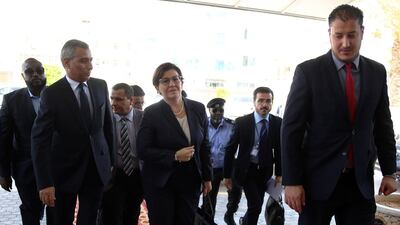Almost seven years after Muammar Qaddafi was toppled, Libya remains a theatre of chaos, fractured between competing factions. Against such a background, Italy’s defence minister Elisabeta Trenta said that Libya was not ready for elections. Italy does “not believe that an acceleration of the electoral process can bring stability,” she said. Her remark, despite being framed as an intervention intended to preserve Libya’s interests, highlights the failure of some EU powers to engage adequately with the north African nation except when it concerns Europe.
Italy’s right-wing government is desperate to stem the inflow of migrants, and Libya, given its position, has suddenly acquired importance after being overlooked for years. Libya is now being conscripted into intra-European debates. “Italy is close to Libya”, Ms Trenta said, “not out ahead of it, and will help it to resist foreign interference”. The “interference” she was alluding to is the effort by France to push for elections in the war-torn country.
Last year, French President Emmanuel Macron brought together Fayez Al Sarraj, head of the UN-backed Libyan unity government, and Khalifa Haftar, the popular general who governs in the east and leads the Libyan National Army, for talks. Both parties agreed then that a political solution accompanied by national reconciliation process could rescue Libya from the ongoing crisis. That meeting was followed up in May with a conference in Paris, which culminated in an agreement to “work constructively with the United Nations to hold credible and peaceful elections on December 10 and to respect the results of the elections”. The agreement was endorsed (but not signed) by Mr Al Sarraj and Gen Haftar, along with Aguila Saleh, the president of the house of representatives, and Khaled Al-Mishri, the head of the council of state.
Observers feared at the time that the agreement was reached too hastily and that Libya would struggle to meet the condition of establishing a constitutional framework and electoral laws by September 16. Yet the meeting in Paris also represented a loosening of the Libyan gridlock. An election would obviously have to be conducted in conditions of stability and security, but Italy’s primary objective appears to be the acquisition of a military outpost in Libya; researchers were flown in to carry out feasibility studies for a potential base on the country’s border with Algeria. The chief obstacle to Rome’s ambitions is Gen Haftar; as the LNA, which is under his control, put it in the past, foreign bases would amount to “a flagrant violation of the rules of international law and a blatant attack on the Libyan state”.
Gen Haftar’s firm opposition to Italy’s plans amplifies the public sentiment in favour of preserving Libya’s independence. An election in December that results in his victory would be an affirmation of Libyan sovereignty – something that may not be to everyone’s liking in Europe. But, after years of conflict, it is Libya and Libyans who should matter. Europe can do a great deal of good – if only it would focus on helping the Libyans.

